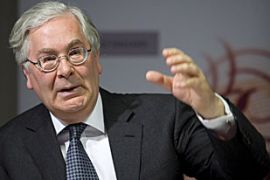Brown in rift with UK central bank
Prime minister dismisses calls by bank’s head to rethink how banks are structured.

Speaking to Al Jazeera, Dr Stephen Barber, a political economist at London’s South Bank University, said: “I think Mervyn King’s intervention was really quite political in many ways.
Barber said King was saying that regulation so far had not gone far enough and that what was needed was a division between “savings, loans and that sort of thing” and this “casino capitalism, great investment banking, which takes big risks … which dominates the City”.
‘Moral hazard’
|
“It is hard to see how the existence of institutions that are ‘too important to fail’ is consistent with their being in the private sector” Mervyn King, governor of the Bank of England |
Speaking in Edinburgh, King had said a rethink of how banks are structured and regulated was needed to prevent a recurrence of the financial crisis.
The governor argued that the use of taxpayers’ money to prop up banks had created “possibly the biggest moral hazard in history” since institutions had an incentive to take risks if they were confident they would be bailed out.
“It is hard to see how the existence of institutions that are ‘too important to fail’ is consistent with their being in the private sector,” King said.
“Encouraging banks to take risks that result in large dividend and remuneration payouts when things go well, and losses for taxpayers when they don’t, distorts the allocation of resources.”
A better way to tackle the problem, the governor suggested, might be to separate utility aspects of banking – payments and basic saving and lending – from riskier speculative activities.
“In other industries we separate those functions that are utility in nature, and are regulated, from those that can safely be left to the discipline of the market,” King said.
‘Breathtaking support’
The governor said it was in the public interest to reduce the dependence of millions of households and businesses on a small number of banks.
 |
| King said ‘never has so much money been owed by so few to so many’ [EPA] |
“If unsustainable capital flows provided the fuel and an inadequately designed regulatory system ignited the fuel, the past two years have shown how dangerous it is to let bankers play with fire.”
The view that banks can be “too big” puts Britain’s central bank governor at odds not only with Brown but also with the Financial Services Authority, the country’s top regulator, which has so far focused its efforts on rebuilding banks’ capital and liquidity buffers.
King said that government support for the banking sector had been “breathtaking” at close to $1.65 trillion.
“Never has so much money been owed by so few to so many. And, one might add, so far with little real reform,” he said.
King’s views on separating the retail and speculative of banks was recently advocated in a report by Paul Volcker, the former chairman of the US Federal Reserve.
Competition lacking
Meanwhile, Britain’s Centre for Economics and Business Research (CEBR) has said that the country’s finance sector is set to pay out $10bn in bonuses this year as banks return to profit less than a year after the near collapse of the financial system.
The centre predicted a 50 per cent leap in bonuses compared to January, from $6.6bn to $10bn.
Barber said: “It’s astounding really given where we’ve come over the last few months, a year ago we were looking at banking meltdown.
“Many people would say, and quite rightly, this is really a quite insensitive thing to happen.
“A trillion pounds of taxpayers money is pumped into the banking system, and even if these banks haven’t directly taken the pound from the taxpayers, they’ve certainly benefited from keeping the banks afloat.”
Douglas McWilliams, the CEBR’s chief executive, said: “Banks’ profits have risen very sharply this year, reflecting a lack of competition in the market.”
“It is not surprising that the increase in bonuses has matched these higher levels of profitability.”
The US banking industry posted landmark profits last week, prompting concern that banks will return to paying staff huge bonuses, a practice blamed for encouraging the excessive risk-taking that exacerbated the global downturn.
McWilliams said any attempt to curb bonuses was “likely to be either unsuccessful or very damaging” unless it addressed the lack of competition that followed the collapse or merging of several banks due to the global crisis.